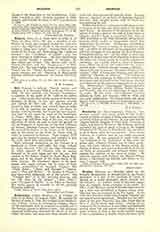

Brillmacher, PETER MICHAEL, b. at Cologne in 1542; d. at Mainz, August 25, 1595. He entered the Society of Jesus in 1558, and studied under Maldonatus, in Paris. Later he returned to Cologne, where, by his diplomatic skill, he rendered invaluable aid to the German princes in affairs of state. His eloquence attracted multitudes, thwarted the efforts of the so-called reformers, and made such deep inroads in their ranks that they determined upon his death. Inviting him to a banquet on pretense of debating disputed doctrines, they mingled poison with his food thus accomplishing his end.
Brillmacher took an active part in the controversies so frequent in his day and was fearless in his attacks upon heresy. An instance of his alertness in the detection of heresy is that of the cure of Notre Dame of Cologne, Stephen Isaac, a converted Jew, who, in 1589, preaching on the Holy Eucharist, advanced arguments which tended to compromise rather than substantiate the doctrine. Brillmacher immediately published his “Controversiarum de Eucharistic, Dialogi”, in which he advanced all the arguments which had been brought for and against the Real Presence, Transubstantiation, etc. In the third of these dialogues he so clearly exposed the duplicity of Isaac that the latter was forced openly to avow his apostasy to Calvinism. In a public letter to John of M Minster, Isaac vilified the Jesuit and called forth the latter’s second work, “Detectio Erroris Joannis a Munster“, followed shortly by another “Exceptio Prodromi Calviniana” (1592, in Latin and German) and still later (1593) by “Epistoler ad Amicum”. The widespread publication and popularity of these overwhelmed his adversaries and won back to the Faith many who had been deceived by the specious arguments of the heretics. Brillmacher’s “Catechismus” first published in 1586, ran through various editions (Latin, German, and Flemish), and was the foundation of many similar works. He also wrote: “Serta Honoris” (various editions in Latin and German, 1565 to 1713) and two early publications “De Communione sub alters Specie” and “Commentarium in Aristotelis Logica”.
T. J. YOUNG

